Ribes aureum
Yellow-Flowering Currant
Yellow-Flowering Currant becomes a broad, rounded shrub. Attractions include the typically fragrant, yellow spring flowers, which are followed by edible berries in summer that turn from yellow to red to black. Canopy coverage: 26 square feet.
[Read More]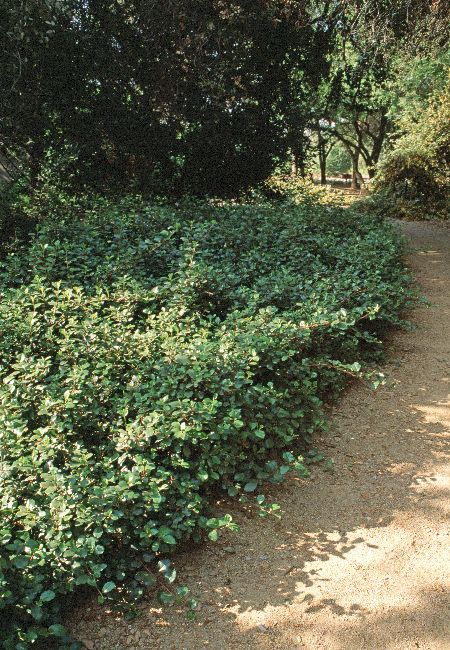
Ribes viburnifolium
Catalina Currant, Evergreen Currant
A low-growing shrub with an open form that spreads roughly twice as wide as its height. Thin, dark red stems contrast with the glossy, deep green, oval leaves that are pleasantly fragrant. Small red fruit that attract birds follow the flowers in late spring. Useful in dry, shaded locations. Canopy coverage: 28 square feet.
[Read More]Robinia neomexicana
New Mexico Locust, Desert Locust
New Mexico Locust can be grown as a tree or shrub but most often a thicket-forming, spiny shrub, useful as a barrier or screen. Note that seeds are poisonous. Flowers are fragrant and are profuse in clusters. The interesting seed pods are dark brown, hairy, up to 4 inches long, and hang on branches for a long time. Canopy coverage: 113 square feet.
[Read More]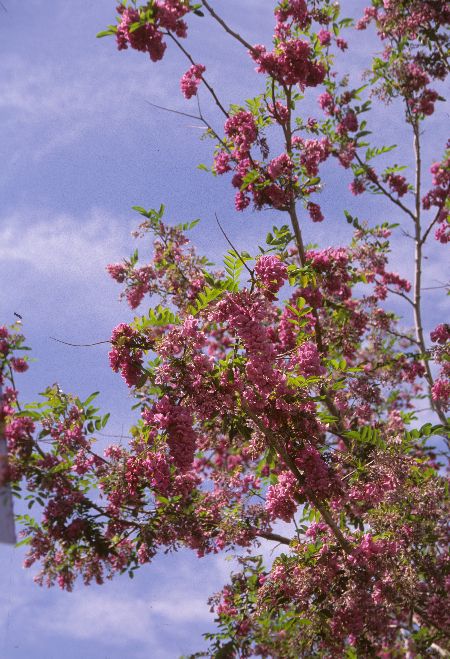
Robinia pseudoacacia
Black Locust
Black Locust has an open, branching form. Requires pruning-training when young to develop into an appealing flowering tree. Canopy coverage: 2,827 square feet.
[Read More]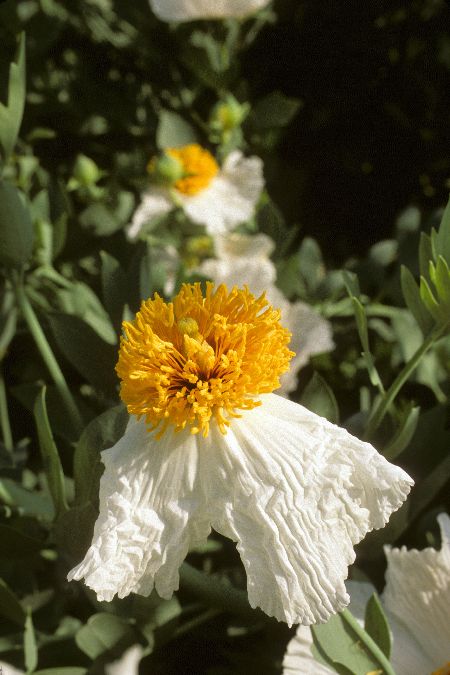
Romneya coulteri
Matilija Poppy
Grown for its spectacular, crepe paper flowers up to 9 inches across. They are pure white with a yellow center, thus one of its common names Fried Egg Plant. Best for an informal, naturalistic landscape. Canopy coverage: 28 square feet.
[Read More]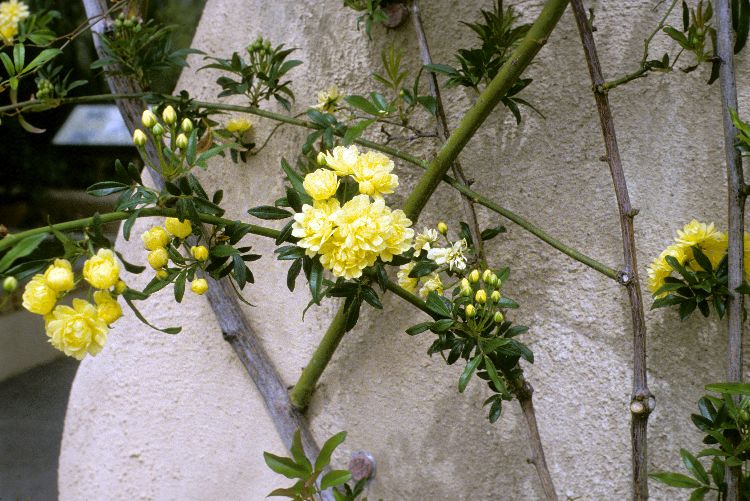
Rosa banksiae
Lady Banks' Rose
Lady Bank's Rose is a sprawling Rose that has no thorns and requires little maintenance. Plants can grow quite large with time. 'Lutea' features pale yellow flowers; 'Alba Plena' has white flowers. Canopy coverage: 491 square feet.
[Read More]Rosa foetida bicolor
Austrian Copper Rose
Austrian Copper is an old garden rose that makes an excellent flowering shrub and security screen. Prickly branches grow in an upright and arching form. Susceptible to blackspot disease. Canopy coverage: 20 square feet.
[Read More]Rosa foetida persiana
Persian Yellow Rose
Persian Yellow is an old garden rose introduced in the 1830s that makes an excellent flowering shrub and security screen. Blooms once a year but profuse in late spring to early summer. Flowers are lightly fragrant. Canopy coverage: 28 square feet.
[Read More]Rosa glauca
Shrub Rose
An Old Garden Rose that serves as a large shrub in the landscape. Interesting foliage in shades of gray-green and purple exist on the canes at the same time. Flowers are small but a striking deep pink color and have a slight fragrance. Large orange-red hips, the seed capsules of Roses, follow flowers and are ornamental as they remain on plant into winter. Canopy coverage: 20 square feet.
[Read More]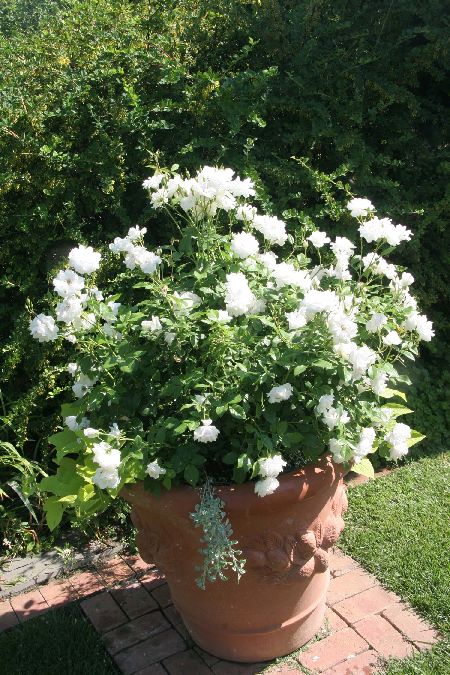
Rosa species
Shrub Rose
There are of course numerous Rose varieties available in every size, flower color and fragrance. Floribunda forms are common Shrub Roses. Also consider David Austin landscape Roses, as well as Old Garden Roses. Photos: red rose hips; 'Iceberg' in container; hot pink 'Old Blush'; white 'Sally Holmes' in landscape and miniature 'Poker Chip'. Canopy coverage: 28 square feet.
[Read More]Rosmarinus officinalis
Rosemary
Rosemary is a desirable shrub for its ability to accept tough conditions, featuring fragrant foliage valued for culinary use. Groundcover forms such as 'Prostrata' are wide-spreading. It is an excellent choice for draping and trailing over the edges of walls and containers. Canopy coverage: 13 square feet.
[Read More]Ruellia brittoniana
Ruellia
Profuse purple, trumpet-shaped flowers bloom during the warm season. Prefers afternoon shade in hot-summer regions. Canopy coverage: 13 square feet.
[Read More]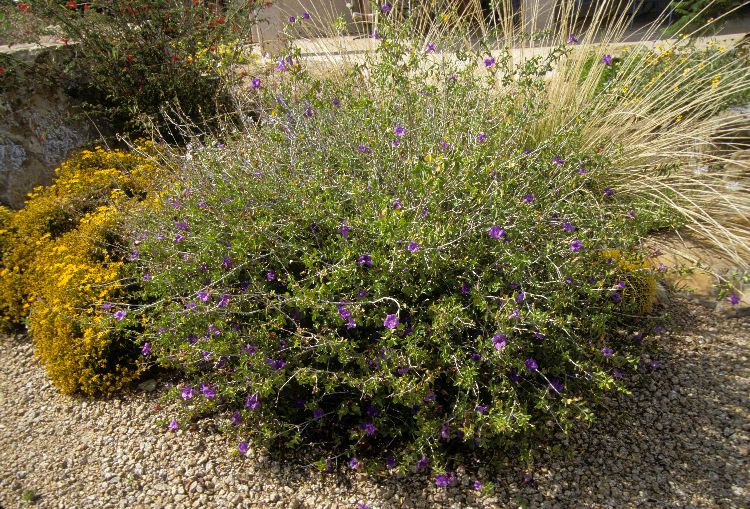
Ruellia peninsularis
Baja Ruellia
Ruellia is a small shrub with a rounded form. Flowers are an attractive shade of purple. Accepts some shade. Canopy coverage: 13 square feet.
[Read More]Salvia apiana
White Sagebrush
A sprawling form and color make this an easy to identify plant. Foliage is aromatic, particularly when brushed. Flowers are white and bloom in spikes above the 4-inch leaves, aging to light pink or lavender. It is a chaparral native so reduce watering in summer. Canopy coverage: 20 square feet.
[Read More]Salvia azurea var. grandiflora
Prairie Sage, Pitcher Sage
Prairie Sage, also known as Pitcher Sage, is a shrubby perennial with sky blue flowers. It is a tough plant that accepts about any well drained soil. In its native habitat it competes with prairie grasses. Cut back in midsummer to develop multi-branching plants that produce more flowers. Canopy coverage: 7 square feet.
[Read More]Salvia clevelandii
Chaparral Sage
A California chaparral native that performs well in desert regions. Foliage has a pleasant, distinctive fragrance when brushed or following rain. Canopy coverage: 20 square feet.
[Read More]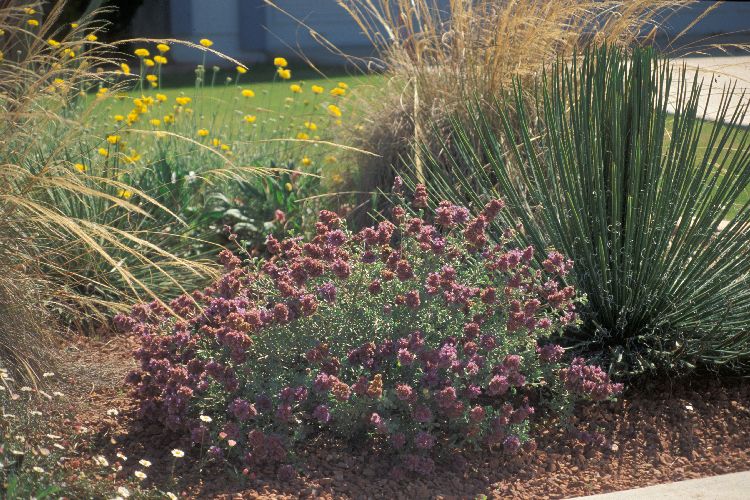
Salvia dorrii var. dorrii
Mojave Desert Sage
Informal growth habit combines well with native subshrubs and perennials in a naturalistic setting. Foliage is aromatic. Canopy coverage: 3 square feet. Photo courtesy Mountain States Wholesale Nursery.
[Read More]Salvia greggii
Autumn Sage
Autumn Sage is a small-scale shrub called a subshrub. It is one of the more forgiving flowering plants for desert regions. Best with some afternoon shade. Many selections are available in a range of flower colors. Canopy coverage: 7 square feet.
[Read More]Salvia mellifera
Black Sage, Honey Sage
Black Sage is a common California native with a growth habit that can be upright to spreading. Plants can sometimes grow larger than the 5 x 5 feet noted if provided ideal conditions. Leaves are dark green above, grayish beneath, and are highly fragrant. Accepts almost any soil. Canopy coverage: 20 square feet.
[Read More]Sambucus mexicana
Mexican Elderberry
Leaf drop usually occurs in late summer and can be more complete with drought. Not refined in appearance, so avoid using close up to outdoor areas. Berries attract birds and can also be made into jelly or wine. Canopy coverage: 314 square feet.
[Read More]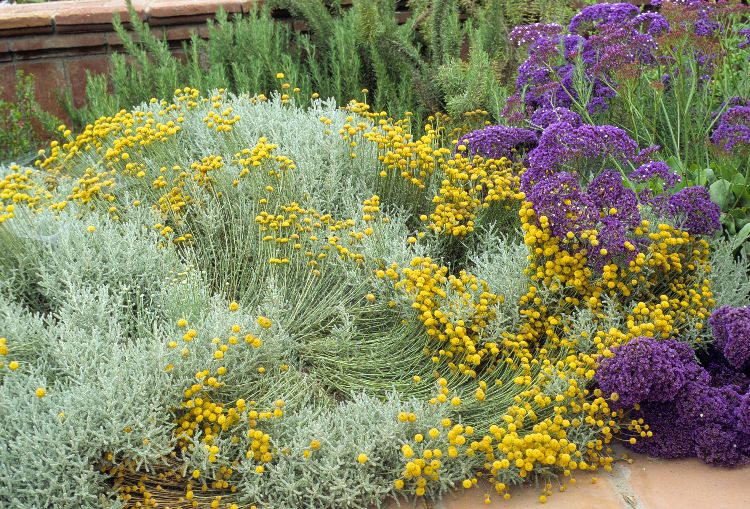
Santolina chamaecyparis
Lavender Cotton
Lavender Cotton is a reliable small shrub or groundcover that lends its silvery gray leaves as bright contrast to green-foliaged plants. Its leaves are aromatic. Plantings are easy to control; keep neat by trimming away spent flower stems. Canopy coverage: 13 square feet.
[Read More]